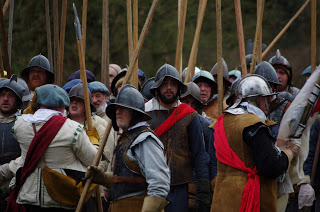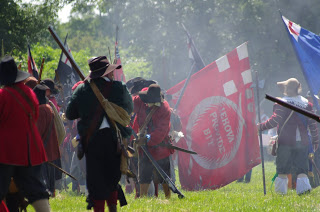Polemos ECW
On a trip down to that there London, I popped in to the annual wargamer festival of mass consumption (aka Salute). Sadly no Civil War display games present this year - the one that was supposed to be there was a 'no show'.
 |
So to 'justify' my visit I purchased the Polemos* ECW rules from the Baccus stand. Yet another ruleset from Pete Berry (he is co-author with David Heading and Edward Sturges) who was looking very hassled behind the till as the EPOS system wasn't working due to poor network coverage.
The 76 page rulebook is split into five sections: set up, core rules, terrain and optional rules, army generators, and appendices. Set up and core rules taking up just 28 pages.
So what do you get in the rulebook?
Lots of tables; good written examples and diagrams explaining rule mechanisms; lots of art by the late Lesley Prince; copious B&W photos; and 4 pages of full colour eye candy to inspire you. All for just a tenner (which at the current exchange rate is less than the cost of two pints, or one if you drink in the posher bits of London).
 |
A base represents a unit. The rules handle foot formations by giving a description of shot, shot-heavy, mixed, pike-heavy, and pike.
Units may be raw, trained, veteran, and in a few instances elite.
The game revolves around something called 'tempo'. Tempo points are calculated at the start of each turn, and are based upon the quality of the commander, the number of units at his command, and the score of a D6.
Players bid tempo points to achieve the initiative on the turn. After all mandatory moves have been completed, the winner of the tempo bid goes first.
 |
Movement and firing distances are measured in base widths.
Combat is resolved using offensive/defensive base points - type and quality of troops added to a D6 score.
 |
On first read the rules seem complicated, and the tempo system far too convoluted. However, these rules give a fun game to play once you have got used to working out 'tempo points': once you've got the hang of tempo, it becomes second nature.
The optional rules cover: terrain and the effects it can have on soldiers; ammunition supply; highlanders; Irish; frame guns; Scottish horse and lancers; and cuirassiers.
I'd recommend a couple of games without any of the optional rules to get your head around 'tempo points'; once you have your head around tempo then add in the extras.
Most rulesets have 'army lists' or point systems to produce balanced armies; this is where Polemos differs, it tries to replicate the unbalanced nature of Civil War warfare by having army generators.
There's also a couple of scenarios thrown in for good measure too.
Equipment needed:
- a handful of D6
- a D10 (for the army generator)
- a D20 (for army morale)
- a measuring device that is divided into your base widths
* if you are wondering what 'Polemos' means it is Ancient Greek for war or conflict










Comments
Post a Comment